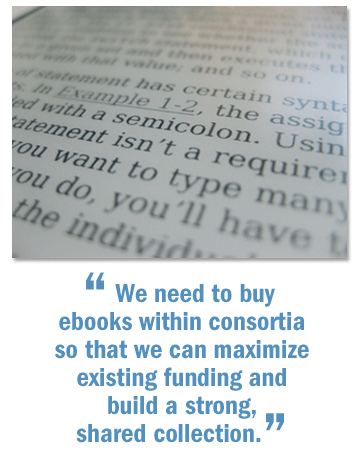I don’t think you should buy ebooks for your library. Nothing personal, this is just math. Right now, ebooks only make economic sense when purchased as part of a consortium. You need to be part of a larger group sharing the costs and distribution of ebooks. And your library needs to carefully consider the type of ebooks being considered.
 So much of the national dialog around ebooks in libraries is focused on new-release fiction for public libraries, but school libraries have very different needs. With the implementation of the Common Core standards spreading across the country, our collection development needs are changing.
So much of the national dialog around ebooks in libraries is focused on new-release fiction for public libraries, but school libraries have very different needs. With the implementation of the Common Core standards spreading across the country, our collection development needs are changing.
The Common Core stipulates that at least half of reading assignments be literary nonfiction for all grades. These are works written in a narrative style, which can be supplemented by primary source documents such as letters and journals. In addition, the Common Core recommends using excerpts of text to directly address a learning objective related to science or social studies standards.
All of this makes literary nonfiction the perfect place for school media centers to begin building an ebook collection—but not in a single library. It just doesn’t add up without the support of a larger consortium like a big school district or a regional educational services agency.
The way forward remains unclear for public libraries regarding new-release fiction in ebook form. School libraries, on the other hand, are lucky to have an amazing group of independent publishers working to resolve the issues. In the case of nonfiction, many of our publishers are offering unlimited, simultaneous access to ebooks. They recognize that ebook usage is governed by math and statistical probability.
For example, in a K–5 school of 600 students, a book about a social studies topic used in the fourth grade is probably only going to be read by about 100 students. If we consider that the fourth grade is likely divided into four classes of 25 students each, then unlimited, simultaneous access becomes nothing more than a marketing term—not a projection of actual usage. This is why a library consortia model is the way to go.
The same formula extends to larger groups. Many K–12 publishers recognize that providing an ebook beyond a single school to a group of 50 schools doesn’t necessarily mean 50 times the use. Therefore many publishers offer price breaks to consortia purchasing ebooks.
For example, if you bought an ebook for $20, a group of 50 schools might buy the same book for about five times as much, or $100 instead of 50 times as much or $1,000. Given a budget of $5,000, your library could purchase 250 ebooks. However, if you pooled your $5,000 along with the other 49 schools in the consortia, the group would have $250,000 and could purchase 2,500 books at the reduced group rate.
Given that scenario, you could have 250 books for your library or shared, unlimited, simultaneous access to 2,500 books. The math seems clear to me.
The big secret is that we can do this right now, without having to request additional funds. I think we need to start pooling our current library budgets within consortia to create regional ebook libraries for literary nonfiction.
We have to buy these new books anyway, so why not buy them digitally and take advantage of the ability to share both access and cost. Within my region, I am suggesting that we pool 20 percent of our state-provided library materials fund. In our case, that comes out to about $30,000, but that means 300 books compared to the 65 books that each library would have been able to purchase with the funds they are sending to the region.
This is what libraries do. Going back to Benjamin Franklin’s idea: we buy books with pooled money and then share them with library members so they don’t have to each buy their own. Now it’s time for us to follow suit. We need to buy ebooks within consortia so that we can maximize existing funding and build a strong, shared collection.
The next big challenge: discerning the ideal size of consortia and an economic model that works for both libraries and publishers. But with our publisher partners working with us, I think school libraries have great potential for success in the ebook world.



Chris – I appreciated your presentation yesterday at the SLJ E-book Summit – We are at the very beginning of our e-book explorations at the Anchorage School District and your comments were incredibly helpful in organizing my arguments for funding a district wide e-book collection for our district even in the face of 30 million in budget cuts Thanks so much
Interesting, although hard to practice for small indepenent schools such as mine- especially after a conversation with an Overdrive rep who told me they were no longer accepting business from new school library consortium members. In the short-term I am buying ebooks & I’m buying them from publishers– and resellers such as Follett– that are creating models that are flexible enough to be accessible to libraries of all sizes.
I am very interested in investigating this concept further and would appreciate information on the logistics of how one would go about setting up such a consortium.